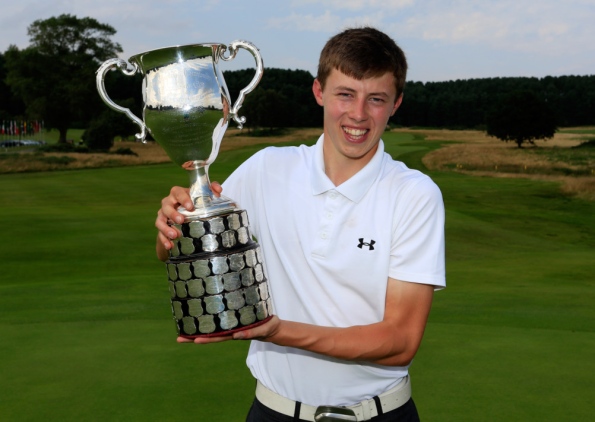BROOKLINE, Mass. -- The first 18 holes of the U.S. Amateur final were an up-and-down affair. There were birdies, a number of long putts (mostly by Matt Fitzpatrick), a chip-in (by opponent Oliver Goss) and, of course, bogeys.
Of the first 18 holes, only seven were halved.
The second 18 played more like a typical USGA event: pars, pars and more pars, as it featured a combined zero birdies between the two contestants. Eight of the 15 holes were halved, and the remaining seven were won with pars. Which is not to say it was boring.
The Country Club is a long and difficult golf course, and Fitzpatrick put on a clinical display. After losing the first hole of the second 18, thanks to a 3-putt bogey, to bring the match back to all square, Fitzpatrick won the 20th hole with a bunker shot to two-and-a-half feet, and a subsequent par save.
From there it was a tee-to-green masterclass, with Fitzpatrick hitting the green in regulation and making par on the next six straight holes as he built a 2-up lead. While he lost No. 9 to a bogey, Fitzpatrick was able to get the shot back immediately with a par on No. 10. He then ran off five straight pars over the hardest part of the golf course to pull away from Goss and win 4 & 3. In truth, once he re-gained the lead on the 20th hole, he never much looked like losing it again and appeared to have his game on cruise control.
While Fitzpatrick appeared in complete control, Goss struggled after the lunch break. While he felt that he hit quality shots, he said he ended up in a number of tricky lies, just off the green. Immediately after squaring the match, he was unable to get chip shots close on Holes 20 and 21 (Nos. 2 and 3) and fell 2 Down. On the 32nd hole (14th), it was a similar story when his chip shot from the back of the green ran well past the hole. The loss of hole put him 3 Down with four to play, effectively sealing his fate.
While he lost the U.S. Amateur, Goss still comes away a winner, as his runner-up finish gets him a spot in the U.S. Open and should secure an invite to the Masters.
Besides Fitzpatrick, the other star of the event was The Country Club itself, which earned universal praise as tough but fair. With the rough up all week, it was hard not to wonder if The Country Club membership was not attempting to use this event as an audition for another U.S. Open, a notion that was not dispelled by the club president's speech at the end of the tournament. In the speech he pointed out, among other things, how challenging the course had played and how much they were looking forward to hosting USGA events in the future. It is an open secret (and I am not sure that it is a secret at all) that The Country Club very much wanted to host the U.S. Open this year, on the 100th anniversary of Francis Ouimet's win at this very venue.
While The Country Club did not host the U.S. Open, they might have received the closest thing to Ouimet's victory. Matt's caddie for the week was his younger brother Alex and observes walking the course, media and fan alike, could not help but notice the striking comparison to Francis Ouimet and his caddie Eddie Lowery, who famously won the 1913 U.S. Open at The Country Club. One obvious difference: While Lowery is generally portrayed as much smaller than Ouimet, Alex, despite only being 14, is nearly as big as his 18-year-old brother and, according to his dad, is already heavier. Another obvious difference: Ouimet was an American; Fitzpatrick is English.
Perhaps it was fitting that an Englishman won the U.S. Amateur at The Country Club. In winning, Fitzpatrick broke a serious English drought in the championship (perhaps because not that many Englishmen have played in it), becoming the first Englishman to win the event since 1911. And he broke an international drought at The Country Club, as the club has historically not treated foreigners well, from Ouimet's victory to the 1999 Ryder Cup.
With this victory and his silver medal as low amateur at the Open Championship in July, Fitzpatrick has probably already locked up one of the more interesting “What I did this summer” essays. But he still has one more golf event on his summer to do list, as he will surely be named to the GB & I Walker Cup team tomorrow. After the Walker Cup, he has to report to school at Northwestern, where he still has yet to pick his classes.
Once at Northwestern, he admits that balancing all of the new-found opportunities that come with being U.S. Amateur champion with his schoolwork might be difficult. One goal will be to get stronger, but he doesn't want getting stronger impacting his technique. And while pro golf is surely on his mind, he wants to continue to improve his game. To that end he has already talked to both Northwestern coach Pat Goss and his current coach Mike Walker about managing that relationship (Goss will give advice, but Matt will probably run it by Walker and Walker's boss, some guy by the name of Pete Cowan).
While his game surely still has room for improvement (his ball flight is currently rather low), Fitzpatrick already sounds like a seasoned pro in one respect: When asked about his schedule, he said he plans to base it around the majors. And on the evidence of one week in Brookline, it does not seem like the rest of his game has far to go either.


2 Comments